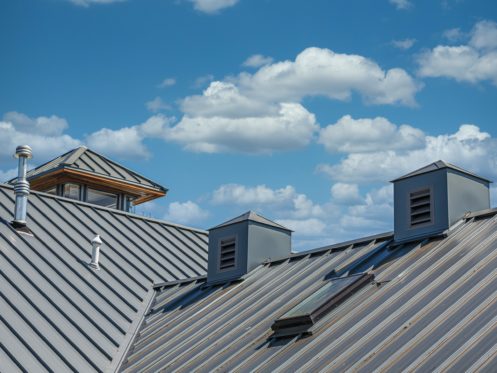Metal roofing can be an ideal choice to put on your building’s rooftop. However, you might be unsure of what gauge is considered to be standard. In fact, standard is a relative term that can rely on a number of factors. These factors can influence the thickness of metal roofing you use on your building.
1. Budget
Metal roofing comes in gauges that typically range from 22 to 29. These numbers reflect the thickness of the metal roofing, with 22 being the thickest gauge and 29 being the thinnest.
Most residential buildings use a gauge of 26. However, the gauge that you ultimately opt for may depend significantly on the budget you have for roofing your building.
As a general rule, the thicker the gauge of metal roofing, the higher the cost you will pay for it. When you are on a tight budget, you might opt for a gauge that ranges from 26 to 29. These gauges cost less money than thicker gauges, such as those that range from 22 to 25. If you opt for a lower gauge metal, you can expect to pay more for it.
2. Weather
The type of weather your building will be routinely exposed to should also influence what gauge of metal roofing you should use on it. Thicker gauges hold up better in challenging weather conditions common in the Gulf Coast and Corpus Christi area like high winds, hail, humidity, and intense heat. Thinner gauges might suffer more noticeable damages like dents and dings from stormy weather.
If you want your building to hold up well during storms, you might consider using a higher gauge metal roofing. It might hold up well even during intense thunderstorms and high winds.
3. Type of Metal
Further, the type of metal you choose may come in different gauges. For example, the gauges used to measure aluminum can differ from the gauges used to determine the thickness of steel or copper. With that, the gauge you use will depend on what kind of metal roofing you ultimately decide is the best choice for your building.
4. Size of the Building
The dimensions of your building can also influence what gauge of metal roofing you use for it. Small buildings like sheds and car ports may not be able to tolerate the weight of heavy gauge metal. The weight of the rooftop might compromise the structural integrity of the building.
With that, it might make more sense to use a gauge ranging from 27 to 29 on smaller buildings with thinner frames. However, if you are roofing a large building, such as a retail store or medical clinic, you may use a thicker gauge ranging from 22 to 25 or 26 to cover its roof. Bigger buildings can tolerate thicker gauge metal roofing.
5. Aesthetics
Finally, the aesthetics can determine what kind of metal roofing you use on your building. Thicker metal roofing might offer a higher level of aesthetic appeal than thinner varieties. It can add to the durable look of your building and increase its value at the same time.
The aesthetics of the gauge you use can also depend on how much hardware you need with which to fasten it to the building’s rooftop. You may not want to use a gauge that requires a large number of fasteners and other components that might be noticeable. You may want the hardware used in putting on the metal roofing to be inconspicuous to enhance the maximum appeal of your rooftop.
Rely on Professional Advice
If you are still not sure about which gauge of metal roofing to use on your building, you can ask a professional roofing service in the Corpus Christi area for help. The roofers you consult with can advise you based on the type of construction you plan on for your building. They can also take into consideration your budget and what kind of return you want on your rooftop’s investment.
Bayfront Roofing and Construction in the Corpus Christi area offers the services you need for your building’s rooftop. Our roofing team can install, repair, and replace rooftops. We can also inspect and repair gutters for clients as well as perform repairs on rooftops after storms. Contact Bayfront Roofing and Construction today to learn more about the metal roofing services available to area building owners.
